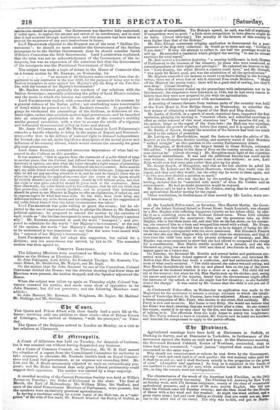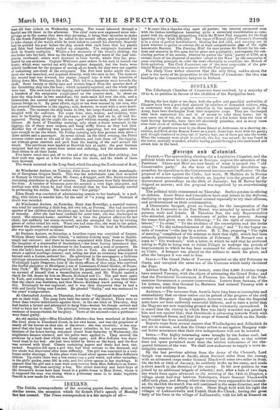'Ibc %Rob Agricultural meetings have been held at Hartsmere in Suffolk,
at Dorking in Surrey, and at Doncaster in Yorkshire, in furtherance of the movement against the duties on malt and hops. At the Hartsmere meeting, the Reverend Richard Cobbold, Rector of Wortbam, contended, that as tithes had been commuted, "equal justice" required that rents should be commuted in the same way— Why should not commissioners or valuers be sent down by the Government, and say "such and such land is of such quality: the real nominal value paid for it shall be so and so; and it shall fluctuate exactly in due proportion to the price of corn." (Laughter and applause.) So long as it remained in the bands of one landlord to screw out 31. per acre, while another would let them have it for 20s., so long the tenants were not independent.
The circumstances of the wreck of the American bark Floridian, on the 28th February, were peculiarly distressing. The Floridian left Antwerp for New York on Sunday week, with 171 German emigrants, mostly of the class of respectable agricultural peasants; and a crew of 20 men, mostly English. She did not leave the Flemish coast till Tuesday evening; and she then stood for the Straits of Dover with a fair wind and fine weather. At night the wind efflifted, and a great storm arose; hail and snow falling so thickly that you could not see from one to the other end of the vessel. The ship was tacked, and put to North-
west till four o'clock on Wednesday morning. The vessel laboured through a fearful sea till three in the afternoon. The chief mate now expressed some mis- givings as to the course they were then pursuing, it being their intention to make for the South Foreland lights: he called to the second officer, and requested him to take charge of the watch while he went below to consult his directory. Scarcely had he quitted his post before the ship struck with such force that her planks and false keel immediately rushed up alongside. The emigrants hastened on deck in frantic confusion. Within a few moments of the vessel's striking, the sea broke into her hull, blew up the hatchways, and swept many of the poor emi- grants overboard; others were drowned in their berths, where they lay, pros- trated by sea-sickness. Captain Whitmore gave orders to his men to launch the boats; which were carried out with the greatest despatch, but the boats were utterly inefficient for the purpose of saving all on board, for they were not capable of containing one-third of the emigrants. The first boat broke adrift the mo- ment she was launched, and capsized directly, with two men in her. The moment the second boat was lowered, the master jumped into it with the intention of lifting down Mrs. Whitmore, his wife. This led to a desperate rush towards the craft. Some twenty or thirty men and women leaped from the quarter-deck of the foundering ship into the ; which instantly capsized, and the whole party were lost. The crew took to the rigging, and lashed themselves there; upwards of a hundred of the emigrants congregated on the quarter-deck. In about an hour the ship broke in two amidships; the main-mast fell over the side, and a tremendous sea carried away the whole of the quarter-deck, with the mass of human beings on it. By great efforts, eight or ten were rescued by the men, who had secured themselves in the rigging; only, however, to meet with a more horri- ble death. The moment the ship broke in two, her cargo floated out, and inter- mingled with the sufferers. For some time, men, women, and children, were seen to be floating about on the packages: ere night had set in, all had dis- appeared. Daring all the night the sea raged without ceasing, and the cold was intense. At dawn of Thursday morning, only about a dozen remained in the rigging; six of these were corpses, and hung stiffly frozen as they had died. Another day of suffering was passed; vessels appearing, but not approaching near enough to see the wreck. On Friday morning only four persons were alive— three sailors and a passenger. At seven o'clock on the third evening, the Petrel revenue-cutter came to the aid of the sufferers, and took them off the rigging, not without great exertion and peril from the beating of the surf around the wreck. The survivors were landed at Harwich late at night: the poor German emigrant had lost his senses from terror and suffering, and the mariners were frost-bitten in all their limbs.
Five brave coast-men put off to the aid of the ship, at her first striking; but their craft was upset at a few strokes from the shore, and the whole of them were drowned.
The wreck occurred on the Long Sand, which lies along the North coast of Kent.
At Winchester Assizes, on Tuesday, John Jones was tried for the manslaugh- ter of Georgians Grigson Smith. This was the unfortunate case that occurred at Romsey in October last, when Mr. Jones, a druggist, sent Mrs. Smith medicine containing strychnine in place of salacine. The particulars were fully detailed at the time. A number of witnesses gave the accused a very high character, and medical men with whom he had lived declared that he was habitually careful in performing his duties. The verdict was "Not guilty."
Ellen Heath was convicted of administering arsenic to her husband, in a pad- -ding, with intent to murder him; for the sake of "a young man." Sentence of death was recorded.
At Winchester Assizes, on Saturday, Mary Ann Beveridge, a married woman, was tried for murdering a little boy, her own son, at Pollees. She had murdered another of her children about two years ago, but had been acquitted on the ground of insanity. After she had been confined for some time, she was discharged as cured. She returned home; exhibited for a time the greatest affection for her child; but suddenly her mania recurred, and she strangled the boy by twisting pieces of calico round his neck. When she had done this, she went to the police, avowed the murder, and resigned herself to justice. On the trial at Winchester, she was again acquitted as insane.
At Durham Assizes, on Saturday, a heartless rogue was convicted of forgery. William Henry Gordon, alias Gibson, "a military-looking man," went to Scarbo- rough last summer; and there he became acquainted with bliss Frances Wright, the daughter of a rnasicseller of Sunderland,—her lover having introduced him. -Gordon pretended to be a Lieutenant in the Lancers, and a man of property. He won the lady's heart, and she eloped with him to York. He there pretended to obtain a special marriage-licence; and, telling her that no ceremony was required beyond such a licence, seduced her. He advertised in the newspapers a fictitious marriage announcement, describing himself as "W. H. Gordon, Esq., Lieutenant, Wallallajab Light Dragoons, (one of the three offiners of that corps who survived the fearful slaughter at Bhurtpoor,) son of Lieutenant-Colonel Gordon, of Danes- limy Park." Mr. Wright was grieved; but his pretended son-in-law gave so good an account of himself that a reconciliation ensued, and Mr. Wright cashed a check for 301. drawn by him on Messrs. Kirkland and Co. The pair went again to York, and nothing more was heard of them for some weeks; it was then found that the check was worthless, and that Messrs. Kirkland knew nothing of Ger- -don. Eventually he was captured; and it was then discovered that be had a wife and family living near London. He pleaded "Guilty," and was sentenced to ten years' transportation.
At Chelmsford Assizes, on Thursday, five of the ' Coggeshall burglars" were put on their trial. The gang have been the terror of the district- There were no fewer than twelve indictments against them: in the one tried on Thursday, they had beaten a farmer and attempted to hang him—beaten his female servant and tried to burn her to death. The principal witness was an accomplice, now under sentence of transportation for burglary. Three of the accused—one a publican— were found guilty.
Au old maiden lady—Miss Elizabeth Jefferies—has been murdered at Bristol. She lived alone in Trencbard Street, in her own house, and was the proprietor of nearly all the houses on that side of the street: site was eccentric; it was sup- posed that she kept much money and many valuables in her possession. The shutters of the house having remained closed from Saturday to Wednesday, the neighbours became alarmed, and the police were applied to. They entered the premises by a back-door which was found open; and Miss Jefferies was disco- vered dead in her bed: she had been killed by blows on the head, and the floor was covered with blood. Closets containing papers and deeds had been ran- sacked. Suspicion fell upon a girl who had been servant to the deceased, and her abode was discovered after some difficulty. The girl was concealed in a coal- !louse under shavings. In this place were found silver spoons with Miss Jefferies's initials. Up-stairs there was a box containing a gold watch and other valuables; in the girl's pocket, some 301. in coin, aud five silver spoons in her stockings. It appears that the girl and a man were seen coming from Mies Jefferies's on Satur- day morning, the man carrying a box. The street-door-key and latch-keys of the deceased's house have been found in a public-house in llost Street, where it is supposed the man was sitting when a policeman came in to make inquiries. Search is now made for this man.



























 Previous page
Previous page